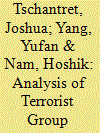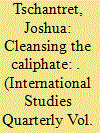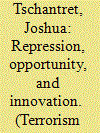|
|
|
Sort Order |
|
|
|
Items / Page
|
|
|
|
|
|
|
| Srl | Item |
| 1 |
ID:
182538


|
|
|
|
|
| Summary/Abstract |
A number of new and exciting datasets on terrorist groups have been created in recent years. However, most data have limited temporal coverage. In this article, we explore a dataset of historical terrorist groups formed between 1860 and 1969 to determine which insights from the terrorism literature are generalizable over time. A cursory look into the dataset reveals several trends that have been overlooked by both the qualitative historical terrorism literature and the quantitative contemporary terrorism literature. We also perform an econometric analysis of terrorist group formation to test hypotheses derived from the extant research. Our results show limited support for existing hypotheses, although civil society participation appears consistently associated with terrorist group formation.
|
|
|
|
|
|
|
|
|
|
|
|
|
|
|
|
| 2 |
ID:
160567


|
|
|
|
|
| Summary/Abstract |
Why do insurgents target certain groups for extermination? Despite a great deal of attention to the targeting of civilian ethnic minorities, comparatively little scholarship exists on insurgent violence against sexual minorities (lesbian, gay, bisexual, or transsexual individuals). This article maintains that the decision to target sexual minorities follows three distinct logics: two strategic and one ideological. First, insurgents face an incentive to outbid rivals by targeting sexual minorities when homophobic violence is politically and socially legitimated. Second, territorial control creates an incentive for insurgents to signal their ability to selectively punish, which they can accomplish through homophobic violence. Third, revolutionary ideologies provide legitimation for exclusionary violence in the pursuit of transforming society. Statistical analysis of insurgent violence against sexual minorities from 1985 to 2015 lends strong support for these arguments. Process tracing of the spread of violence against sexual minorities in Iraq and Syria clarifies the strategic causal mechanisms. When progovernment militias targeted perceived homosexuals with impunity, antigay violence was adopted by insurgent groups seeking to legitimize their claims to power; violence then quickly spread to competing insurgents. Two additional cases from Latin America demonstrate that ideology plays an important role in influencing which groups embrace homophobic violence even under these strategic constraints.
|
|
|
|
|
|
|
|
|
|
|
|
|
|
|
|
| 3 |
ID:
181746


|
|
|
|
|
| Summary/Abstract |
Scholars observe that we know little about what motivates non-state actors’ strategic interest in nuclear technology. This article argues that insurgents with ideological ambitions to form new states adopt acquisitive or destructive interests because nuclear power is a symbol of state legitimacy. State-seeking insurgents—separatists and revolutionaries—require domestic constituencies to recognize them as legitimate sovereigns. However, they differ in their need for international legitimation. Separatists’ demand for international acceptance deters them from pursuing nuclear weapons, which poses an international security threat. They will nonetheless attack the state’s nuclear facilities in areas they consider their national homeland to assert the legitimacy of their claims over these regions. Since revolutionaries do not expect international acceptance, they can pursue nuclear technology to enhance their legitimacy among key domestic audiences. Statistical analysis and qualitative examination support these hypotheses.
|
|
|
|
|
|
|
|
|
|
|
|
|
|
|
|
| 4 |
ID:
163189


|
|
|
|
|
| Summary/Abstract |
How does state repression affect the incidence and impact of terrorism? This study conducts a process tracing analysis of the ongoing contention between the Uyghur separatist movement and the Chinese state to provide a plausible explanation for the present lack of consensus on this question. Relying on insights from collective action theory, it argues that although repression was initially successful in curtailing the opportunistic use of terrorism, novel political opportunity allowed some separatists to adopt innovations, such as suicide bombing, to circumvent repression. Repression has since proved ineffective in quelling terrorism, and will likely remain incapable of forestalling future terrorist innovations.
|
|
|
|
|
|
|
|
|
|
|
|
|
|
|
|
| 5 |
ID:
192016


|
|
|
|
|
| Summary/Abstract |
Why did modern terrorism arise as a form of political violence? Scholars have located its origins in the mid-nineteenth century, a development that culminated in a global wave of terrorism and contributed to the outbreak of World War I. Despite consensus on its period of origin, we lack any explanation for why this development occurred. This article forwards a social theory for the origins of modern terrorism. Civic associations, which proliferated globally in the nineteenth century, provided the opportunity and motivation for the development of terrorism. Associations not only fostered the social and human capital necessary for terrorism; they also frequently generated grievances through an inability to enact political change and via ideological propaganda. I test this theory using an original global dataset of terrorist groups formed between 1860 and 1945. Statistical analysis reveals that cities with a YMCA, an exogenous indicator of associationism, were much more likely than those without to see the formation of terrorist groups. Additionally, terrorist groups are formed during civil wars, indicating that armed conflict can spur dramatic innovations in violent contention.
|
|
|
|
|
|
|
|
|
|
|
|
|
|
|
|
|
|
|
|
|